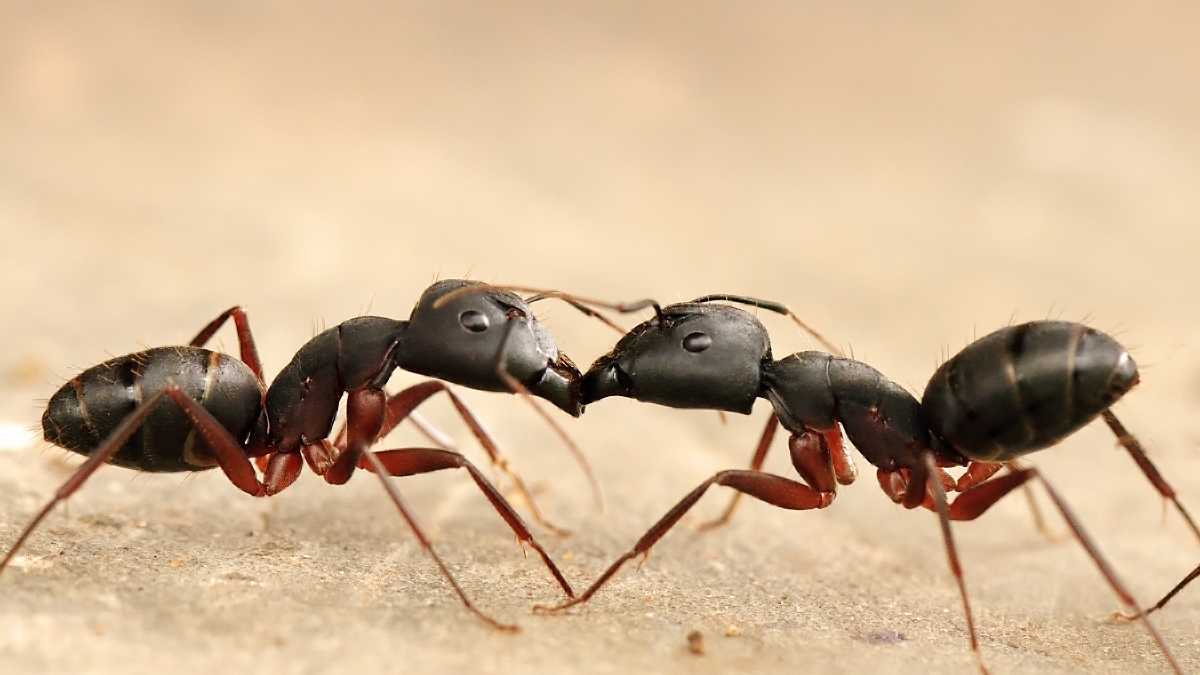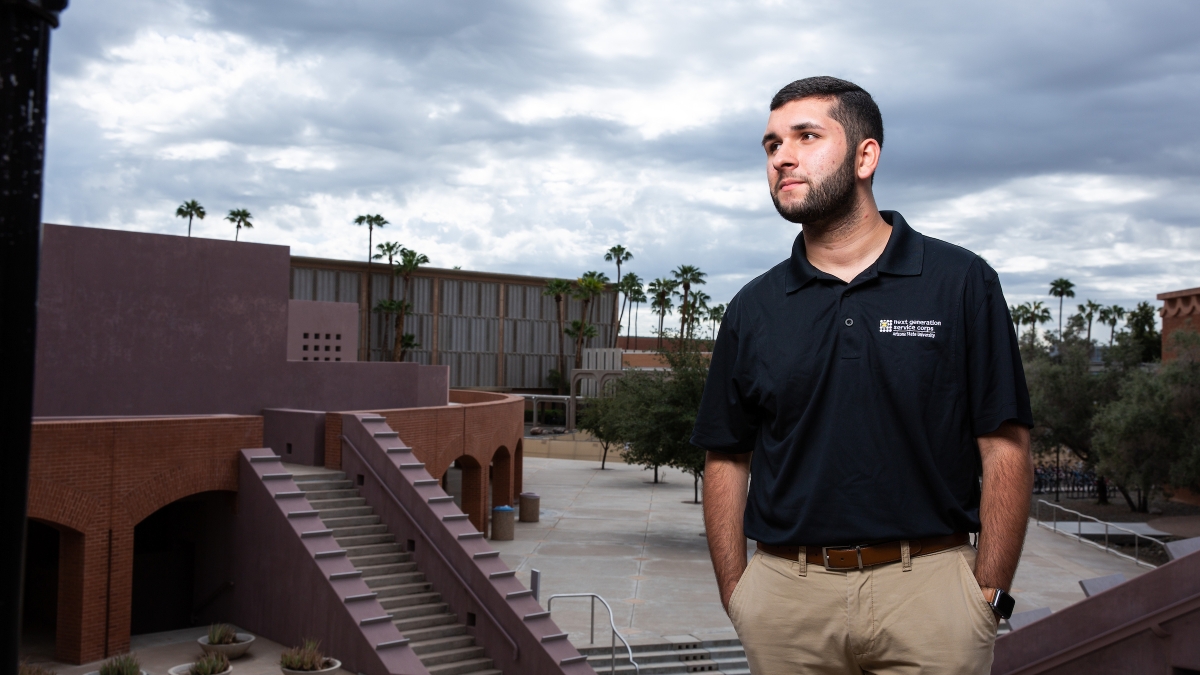If you had to choose one word to sum up the life of Arizona State University freshman Jairo Ramirez, it would be "resilience."
A little over a year ago, Ramirez and his family sheltered in their home for 11 hours while Hurricane Maria wreaked havoc on their Puerto Rican neighborhood and went on to devastate the entire island. This year, he is attending his first year at ASU and upping his academic game.
Despite the hurdles of striking out on his own, leaving his family behind and learning a new language, Ramirez is thriving in this new environment. And he wants to give back.
He is doing just that through ASU’s Public Service Academy, where he serves in the Next Generation Service Corps. He hopes one day that he’ll be able to assist others when a disaster strikes them.
ASU Now spoke to Ramirez about surviving Hurricane Maria and the new ASU chapter of his life.
Question: You and your family were living in Puerto Rico when Hurricane Maria devastated the country in September and October of 2017. Tell me about that experience and how it affected you and your family.
Answer: Getting news of a hurricane or storm coming was a normal thing during hurricane season in Puerto Rico, yet no big hurricane had hit us in decades. This made everyone overlook warnings, and Maria was no exception. People were not ready for it; I was not ready for it. The eye came in sometime around 6 a.m. and came out at around 5 p.m. Those were the longest 11 hours of my life. During the time of the hurricane, the wind made noises that will forever be etched in my mind. Water came into the house through every corner, and our street flooded about three feet. Once the winds started to calm down, we had to go into the street and unclog the sewage systems to prevent the flooding from increasing anymore. Once the winds stopped, there was just dead silence. I went out of my house and could not believe the magnitude of the disaster; I could not even recognize the streets I grew up on.
For a week we had no water, and for three weeks I could not attend school. For nine weeks we had no power. The first weeks were chaotic as there was no power anywhere, no communication, the lines for gas were at least three hours long. We knew it was bad, but we had no idea of the gravity, as there was access to absolutely nothing. My dad’s work as an insurance broker was probably one of the worst jobs you could have had after the hurricane because hundreds of clients were trying to make claims — and with extremely poor communication. It was next-to-impossible to work. Insurance companies were refusing to pay claims after the hurricane or were paying at a very slow rate and amounts smaller than what was needed, and now companies are raising policy prices or even denying lifelong clients. It has been a slow recovery, but I strongly believe that Puerto Ricans will rise stronger than before.
Q: Was it hard to leave your family to attend ASU, given that your country has not fully recovered?
A: I lived my whole life back in the island and leaving to pursue my education was something I always wanted to do. I knew leaving my country would be a very hard experience, and leaving it after the hurricane made it even harder. I finished my application to ASU about a month after the hurricane, and the opportunities of getting to work in the energy sector with the support of the Public Service Academy was something that made ASU stand out by the end of my application process. I wanted to help solve the energy crisis before the hurricane and seeing my country’s power system devastated after the hurricane made it even more significant to go into the energy field.
I had set my sights on ASU because of the great work being done in solar energy research, and then many other things, such as the PSA, made ASU the clear choice. I confirmed my enrollment sometime in March, and that was the first time I felt scared of crossing the ocean. During the summer, I would think about everyone I was leaving behind and how hard adapting would be. When I got here, it was relieving to see the community’s support and understanding, and I consider ASU my second home.
Q: Why did you join the Public Service Academy — given that you were living in a foreign country, speaking a second language and taking on a rigorous academic schedule?
A: I joined the Public Service Academy even though it was very far from home because I saw in it the potential to help me reach my goals and to help me serve while doing something that I love. I have always believed that the challenge I want to tackle, energy scarcity, is a challenge that needs to be attended by all sectors, not only the engineering one. Technology is there and ever-growing, but policy and education are big hurdles to the advancement of renewable energy sources such as solar power. The Public Service Academy has acknowledged this fact and seeks to create leaders that can bring all sectors together to work on a common goal.
I knew becoming part of this program while being an engineering major and being part of Barrett (The Honors College) would be a challenge, but I have always loved being challenged as it makes me grow as a person, student and leader. Back home I was part of the JROTC program in my school; once, a former battalion commander gave a speech to our battalion challenging us to go for the three diamonds, the highest rank in JROTC, and I did not make it to the three diamonds, but I became Battalion XO, the second in command of the battalion, and got two diamonds. It has been very challenging to adapt to this new culture, language and people, but I have slowly been adapting — especially to the new language. All in all, my life at ASU and the Public Service Academy has just started and I am very excited to see all the opportunities I will be presented here and I am eager to work on them.
Q: What specifically do you enjoy about being in the Public Service Academy?
A: Being part of the Public Service Academy has been one of the greatest opportunities in my life. In the Public Service Academy, I find myself surrounded by people that have the same genuine desire as I have of changing the world for the better. Being in a setting that nurtures service and focuses on creating character-driven leaders is what I like the most about the PSA. Having the support of faculty and peers is of utmost importance in staying on one’s track. Through the PSA, I have been learning that today’s challenges cannot and will not be solved by a single individual, rather by communities of service-driven leaders who come together under one single mission.
Q: Did the irony hit you that in the Public Service Academy you might be helping people like yourself in the wake of Hurricane Maria?
A: I was raised in a house and a country were serving others is highly valued, and throughout my childhood I had many opportunities to serve my community and even communities in other countries. I had my first big service experience in a mission trip I did to the Dominican Republic in which we helped two small towns close to the border with Haiti in the areas of health care and education focused on children. This experience shaped my life by opening my eyes to real poverty and how big the challenges that come with it are. After the hurricane, I felt compelled to help my country recover and I did so through the American Red Cross. I helped in a couple of supply distribution missions right after the hurricane and during this last summer I volunteered in the ARC recovery program. This program was an incredibly rewarding experience as I got to work in the logistics of installing solar panels in shelter schools, providing health care curriculums for children to small rural clinics, provide microgrants to small farmers and other great initiatives that have helped many people around the island recover. It has been interesting to see that a lot of the work done here at ASU and the PSA resonates with what I have done throughout my life and seek to do my entire life.
Q: What are your plans after you graduate ASU and the Public Service Academy?
A: Here at ASU I am studying mechanical engineering with a focus in energy and environment and I seek to continue in the accelerated program to have a solar energy engineering and commercialization (professional science master's degree). I will use the tools given to me by both ASU and the PSA to work towards the goal of making America and the world shift towards renewable energy, be it through research, education or policy. What I will do after college is uncertain in the sense of my exact path, but anything that helps achieve this goal would be something I would pursue. In any form I can, I will contribute to the public good in the U.S., in Puerto Rico and wherever I have the opportunity to.
Top photo: Engineering freshman Jairo Ramirez poses for a portrait outside the ASU Art Museum on Oct. 11, 2018. Ramirez chose to serve in the Next Generation Service Corps, a decision influenced by his family's experience with Hurricane Maria in Puerto Rico in 2017. Photo by Deanna Dent/ASU Now
In celebration of Veterans Day, Arizona State University proudly honors veterans and active members of the military through Salute to Service. Your support helps veterans succeed. Text ASUVets to 41444 to donate to the Veterans Education Fund or visit veterans.asu.edu to learn how you can honor a veteran.
More Sun Devil community

Army veteran dedicates PhD to exploring the social order of ant colonies
While Colin Lynch was enlisted as a medic in the National Guard, he had a pastime that was quite different from that of his peers: He also volunteered as a researcher in a social insect lab at the…
College of Health Solutions grad, soccer star hopes to make the big leagues
A staple lineup defender on the Sun Devil women’s soccer team, Lauren Kirberg is looking to join the National Women’s Soccer League (NWSL) after graduating from the College of Health Solutions…

ASU grad finds her calling in advocating for people through clinical research
Rhiannon Elliott-McGaugh-Mask grew up hundreds of miles away from an ocean, but that wasn’t an issue when deciding her future career.“I wanted to go into marine biology, which is pretty common with a…
